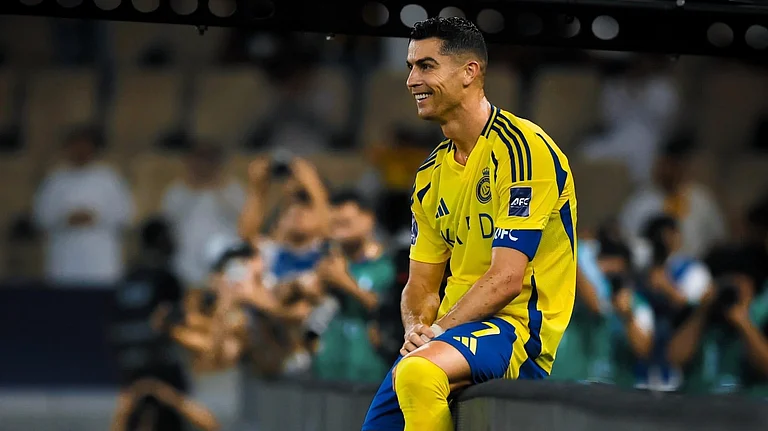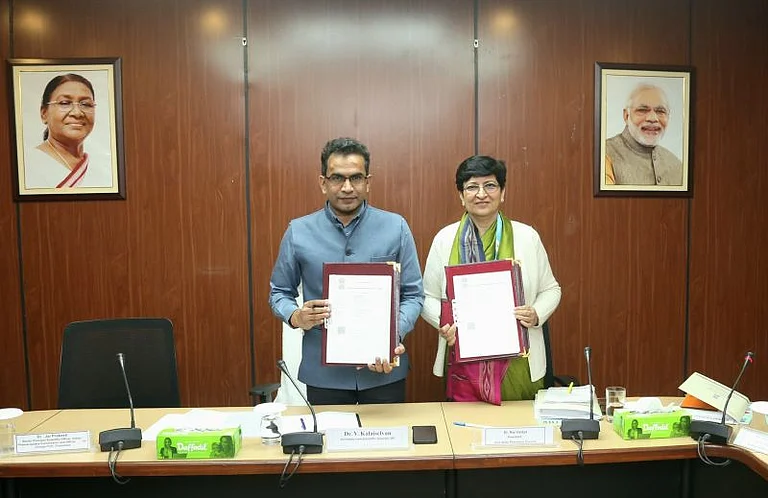Urbane, civilised, scholarly, warm, scrupulous…to this list of distinguishing Gujral characteristics, we must not add expansive. As the unease over the Prime Minister's hands-off approach mounts, Mr Gujral has at great length and with some eloquence -- most notably to the Hindu's Malini Parthasarathy and Nalini Singh of Doordarshan -- been explaining why he has adopted a particular style of governance. It is only fair, therefore, that the Prime Minister's defence of his style be summarised before it is critically examined.
Mr Gujral explains it thus: The Prime Minister and the Prime Minister's Office urgently require to have their dignity restored after the battering both have received in the last three decades. Since the premier traces his political lineage to Jawaharlal Nehru, nothing short of the highest standards of personal and professional integrity will do. Consequently, it is imperative for the tenant of 7, Race Course Road to be impartial, neutral. Non-aligned, as it were.
Mr Gujral then addresses those who accuse him of having no 'agenda'. He says he most definitely has one -- and that is to "strengthen, preserve and revive the democratic institutions of India". He cites the instances when he refused to meet the governor of Bihar and Joginder Singh of the CBI. "I told him (the governor) that it is neither in your interest nor in the interest of the institution that you should meet me at this stage." Here, again, no sane person will fault Mr Gujral's logic.
Finally, he refutes the criticism regarding the smack of firm government and the exercise of prime ministerial authority. Mr Gujral has no time for either. "I am reminded of Dickens'
A Tale of Two Cities. That every morning a head must be chopped…once I start doing that you (the media) will perhaps say that I was the best man to occupy the seat of prime ministerial authority is best asserted quietly, even covertly, and should have a substantial "moral" lacing. He reminds the nation what happens when authority is exercised energetically. Remember the Emergency? Clearly, the leader of the United Front does not subscribe to Harold Macmillan's view that "to be a good prime minister you have to be a good butcher."
This, in short, is the Gujral Doctrine when it comes to domestic affairs and there is no reason to assume it is artifice or insincere. During his interview with Nalini Singh on Doordarshan, Mr Gujral actually broke down as he listed his core convictions. It was one of the most moving television moments I have seen in the last few years.
However much one may admire the gigantic tasks the Prime Minister has set himself, which if begun now should take us into the next century, we have to ask some uncomfortable questions. These questions may appear petty, soiled, even crooked, but they will determine how long the incumbent is employed. The early exit of a prime minister who says all the right things and has all the right ideas, a prime minister the nation desperately needs, would be a real tragedy.
Can you imagine a scene where I.K. Gujral is sitting with Laloo Prasad Yadav and the other Yadav over a cup of tea discussing the feud which threatens to tear the Janata Dal apart? The PM turns to Laloo and begins with the need to protect democratic institutions. If you resign as chief minister of Bihar, if you withdraw from the party president's race, what a shining example you will set as you uphold the highest standards of public life. He then turns to Sharad and requests him to withdraw for similar lofty reasons.
For Gujral, authority is best asserted quietly, even covertly, Clearly, he does not subscribe to Harold Macmillan's view that 'to be a good PM you have to be a good butcher'.
Since the above is a hypothetical mise en scene we cannot be certain how the two Yadavs would respond, but there is a good chance that they would be struck dumb with incomprehension. Democratic institutions, probity…had the salubrious environs of the India International Centre caused their leader to lose grasp of reality completely?
Laloo and Sharad might tell the PM that politics essentially is about winning power and then retaining it. Realpolitik, not idealism, should be the guiding star. They could add that all the wonderful things Mr Gujral is anxious to do --strengthening institutions etc -- can only be done if he holds on to his present job.
The Prime Minister surely knows that politics is not about the truth but perceptions of the truth. This is regrettable but true. All over the world statesmen and shysters engage a battery of spin doctors, public relations experts and media advisors to ensure that the electorate gets the packaged message the candidate wishes to disseminate. Images and soundbites take over to some degree from policy and programmes. It is a fortunate nation which has a leader without the need of a spin doctor to bridge the gap between the truth and perceptions of the truth most times 'organised lying' -- Malcolm Muggeridge's felicitous phrase for the image industry -- is necessary.
The prevailing perception, then about Gujral is that he is aloof, disengaged, unwilling to grip the day-to-day exercise of executive power. This is not to belittle his larger goals, but he has to remember that as Prime Minister of India, he is also its Chief Executive Officer.
Critics cite three reasons for the Gujral style:
The above-mentioned reasons may be a piece of fiction, but that is the perception -- and it grows by the day.
To expect Mr Gujral to crack the whip or chop heads or bawl at his ministers publicly is unreasonable knowing the kind of person he is. What is needed is a more engaged and involved prime minister conveying the impression that he is prepared to get his hands dirty. The trick is to remain impartial while actively engaged in separating Laloo and Sharad. The trick is to summon Joginder Singh and give him a dressing down without appearing to interfere in the agency's functioning. To remain merely an interested spectator's fraught with danger.






















